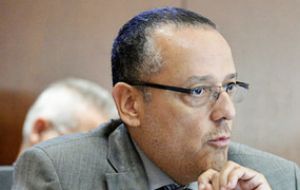MercoPress. South Atlantic News Agency
Health professionals from Latam and Caribbean train for management of Ebola
 ”The goal of the workshops is to strengthen the clinical response capacity of doctors and nurses assigned to treat Ebola patients,” said Dr. Marcos Espinal
”The goal of the workshops is to strengthen the clinical response capacity of doctors and nurses assigned to treat Ebola patients,” said Dr. Marcos Espinal  During each 3 day workshop, participants will learn about the history and epidemiology of Ebola and how to detect, isolate, and manage suspected cases
During each 3 day workshop, participants will learn about the history and epidemiology of Ebola and how to detect, isolate, and manage suspected cases Health professionals from more than 30 countries in Latin America and the Caribbean will receive training in clinical management of Ebola in three upcoming workshops sponsored by the Pan American Health Organization/World Health Organization (PAHO/WHO). The workshops are part of a series of PAHO/WHO actions intended to help countries strengthen their preparedness for potential cases of Ebola.
The “train-the-trainer” courses will take place on 1-3 December in Antigua and Barbuda, for Caribbean health professionals, and on 3-5 and 9-11 December in Chile, for health personnel from Latin America. Participants in the three workshops are expected to train other health professionals in their home countries upon their return, with PAHO/WHO support.
“The goal of the workshops is to strengthen the clinical response capacity of doctors and nurses who have been assigned to treat Ebola patients,” said Dr. Marcos Espinal, Director of PAHO/WHO’s Department of Communicable Diseases and Health Analysis. “After this training, we’ll have health staff who are better prepared to rapidly detect cases, isolate and treat them, and prevent the disease’s spread.”
Some trainees are also expected to participate in specialized international teams that could be mobilized by PAHO/WHO to provide support in clinical response and outbreak control to any country in the region that is affected by Ebola.
During each three-day workshop, participants will learn about the history and epidemiology of Ebola virus disease and how to detect, isolate, and manage suspected cases. The training will also cover diagnosis and clinical management, use of personal protective equipment, organization of specialized treatment units, and aspects of infection prevention and control.
Workshop facilitators are all professionals with experience in management of Ebola and other infectious diseases. In addition to PAHO/WHO staff, they include experts from the Carlos III Hospital in Spain; Emory University Hospital in Atlanta, Georgia, and St. Patrick’s Hospital in Missoula, Montana, USA: the U.S. Centers for Disease Control and Prevention (CDC) and the U.S. National Institutes of Health (NIH); and Brazil and Chile.
Trainees will include health professionals from Argentina, Bahamas, Barbados, Bolivia, Colombia, Costa Rica, the Dominican Republic, Ecuador, El Salvador, Guatemala, Honduras, Jamaica, Mexico Paraguay, Peru, Trinidad and Tobago, and Uruguay, among other countries. Participants were selected by their countries according to their professional medical and teaching experience, work in a national hospital, and willingness to serve as trainers in their own countries and support PAHO/WHO missions to other countries of the region.
PAHO/WHO has undertaken a series of actions to help its member countries in Latin America and the Caribbean ensure they are able to detect, contain, and prevent local transmission of any imported case of Ebola.
The Ebola outbreak in West Africa was declared a public health emergency of international concern by WHO Director Margaret Chan on 8 August 2014. By 21 November, more than 15,000 cases and nearly 5,500 deaths had been reported, mostly in Guinea, Liberia, and Sierra Leone. In the Americas, only the United States has reported cases of Ebola, however, the possibility of imported cases in other countries of the Americas cannot be discarded.




Top Comments
Disclaimer & comment rules-

Read all commentsIt is ok for Argentina as everyone knows that they have ethnically cleansed the country so no Afro- Caribbean would want to go there anyway. Save the money and sort your economy.
Nov 29th, 2014 - 03:13 pm 0Commenting for this story is now closed.
If you have a Facebook account, become a fan and comment on our Facebook Page!